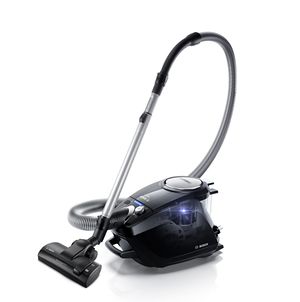Bagless vacuum cleaners
Siemens was involved in the development of the modern vacuum cleaner from the outset. The dust suction pump, a large portable device with a small motor and water filter was launched on the market as early as 1906.[1] It wasn't long before the models became more convenient and quieter. The image of a sleeping infant was used to advertise the Siemens Protos vacuum cleaner in 1934. BSH[2] drew on the vacuum cleaner expertise of Siemens and perfected a modern classic for the Bosch brand in the first decade of the 21st century – the bagless vacuum cleaner with SmartSensor Control.
Luxury products for Japan
Bagless vacuum cleaners have existed since the 1980s. They were invented by the British James Dyson, who produced them initially as a luxury product for the Japanese market.[3] The appliances also became popular in Europe from around the mid-1990s. However, the technology at that time did not as yet offer major advantages over traditional bagged vacuum cleaners.
Bagless vacuum cleaners operated on the basis of what is known as single or multi-cyclonic technology. One or more cyclones, in other words, air vortexes, formed inside the vacuum cleaner with the inflowing air. The centrifugal power forced dust and larger dirt particles out into a collection container, while the clean air was suctioned in the middle through a fine dust filter. The collection container could simply be removed and emptied after use.
While the absence of a vacuum cleaner bag did mean lower follow-on costs, the initial purchase prices were generally significantly higher as a result. The first bagless vacuum cleaners were still very loud and hence not particularly popular.
Best in test
BSH took its time and perfected the still fledgling technology for its own products. The first BSH vacuum cleaner with SensorBagless technology was launched on the market in 2009.[4] In 2010, BSH succeeded in making a breakthrough in England, the homeland of the bagless vacuum cleaner, with the Bosch Roxx'x BGS 61B42. The appliance boasted innovative compressor technology, high air flow rate and SelfClean system. As one of the quietest of its kind in Europe, the vacuum cleaner achieved the best result that a bagless vacuum cleaner had ever recorded in tests carried out by the British "Which?" consumer association.[5] The success was then surpassed the following year when the Bosch Roxx'x BGS 61430 was voted test winner in 2011 by the German consumer research periodical Stiftung Warentest. It thus successfully out-performed not only all bagless models, but also the traditional vacuum cleaner for the first time.[6]
SmartSensor Control
The new bagless vacuum cleaner models contributed significantly to the success of the Bosch bagless series. In 2013, Bosch presented the Relaxx'x ProSilence 66, the Zoo'o ProAnimal, the Roxx'x and the Runn'n: The four models offered different highlights and all guaranteed excellent cleaning performance. The Bosch vacuum cleaners came out on top in tests by Stiftung Warentest in the "Cylinder vacuum cleaner with dust box" category – 2015 the Roxx'x BGS6ALL, 2016 the Relaxx'x BGS5331. The latest generation vacuum cleaners are equipped with intelligent sensor technology to automatically monitor the suction power.
Notes
- ↑ 150 Jahre Siemens. Das Unternehmen von 1847 bis 1997. Produced on behalf of Siemens. Munich 1997, page 42
- ↑ BSH was founded in 1967 as Bosch-Siemens Hausgeräte GmbH - BSHG for short. In 1998, the name was changed to BSH Bosch und Siemens Hausgeräte GmbH, with the short form BSH. Since the sale of the Siemens shares in BSH to Robert Bosch GmbH the company’s name is now BSH Hausgeräte GmbH, but still BSH for short.
- ↑ BSH Corporate Archives, A05-0033, BSH inform, Heft 4/2010, Jg. 33, page 11.
- ↑ BSH Corporate Archives, A01-0035, Business Report 2015, page 28.
- ↑ BSH Corporate Archives, A05-0033, BSH inform, Heft 4/2010, Jg. 33, page 11.
- ↑ Stiftung Warentest Heft 4/2011.
